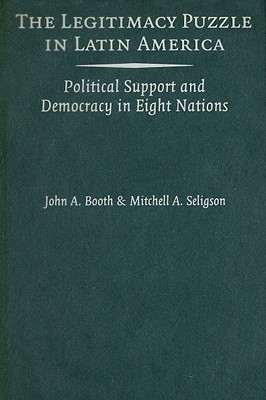
- We will send in 10–14 business days.
- Author: John A Booth
- Publisher: Cambridge University Press
- ISBN-10: 0521515890
- ISBN-13: 9780521515894
- Format: 15.8 x 23.1 x 2.8 cm, hardcover
- Language: English
- SAVE -10% with code: EXTRA
Reviews
Description
Political scientists for more than two decades have worried about declining levels of citizens' support for their regimes (legitimacy), but have failed to empirically link this decline to the survival or breakdown of democracy. This apparent paradox is the "legitimacy puzzle," which this book addresses by examining political legitimacy's structure, sources, and effects. With exhaustive empirical analysis of high-quality survey data from eight Latin American nations, it confirms that legitimacy exists as multiple, distinct dimensions. It finds that one's position in society, education, knowledge, information, and experiences shape legitimacy norms. Contrary to expectations, however, citizens who are unhappy with their government's performance do not drop out of politics or resort mainly to destabilizing protest. Rather, the disaffected citizens of these Latin American democracies participate at high rates in conventional politics and in such alternative arenas as communal improvement and civil society. And despite regime performance problems, citizen support for democracy remains high. These findings resolve the puzzle - citizen actions and values, even among the disaffected, likely strengthen rather than weaken democratic governments.
EXTRA 10 % discount with code: EXTRA
The promotion ends in 20d.20:45:03
The discount code is valid when purchasing from 10 €. Discounts do not stack.
- Author: John A Booth
- Publisher: Cambridge University Press
- ISBN-10: 0521515890
- ISBN-13: 9780521515894
- Format: 15.8 x 23.1 x 2.8 cm, hardcover
- Language: English English
Political scientists for more than two decades have worried about declining levels of citizens' support for their regimes (legitimacy), but have failed to empirically link this decline to the survival or breakdown of democracy. This apparent paradox is the "legitimacy puzzle," which this book addresses by examining political legitimacy's structure, sources, and effects. With exhaustive empirical analysis of high-quality survey data from eight Latin American nations, it confirms that legitimacy exists as multiple, distinct dimensions. It finds that one's position in society, education, knowledge, information, and experiences shape legitimacy norms. Contrary to expectations, however, citizens who are unhappy with their government's performance do not drop out of politics or resort mainly to destabilizing protest. Rather, the disaffected citizens of these Latin American democracies participate at high rates in conventional politics and in such alternative arenas as communal improvement and civil society. And despite regime performance problems, citizen support for democracy remains high. These findings resolve the puzzle - citizen actions and values, even among the disaffected, likely strengthen rather than weaken democratic governments.


Reviews